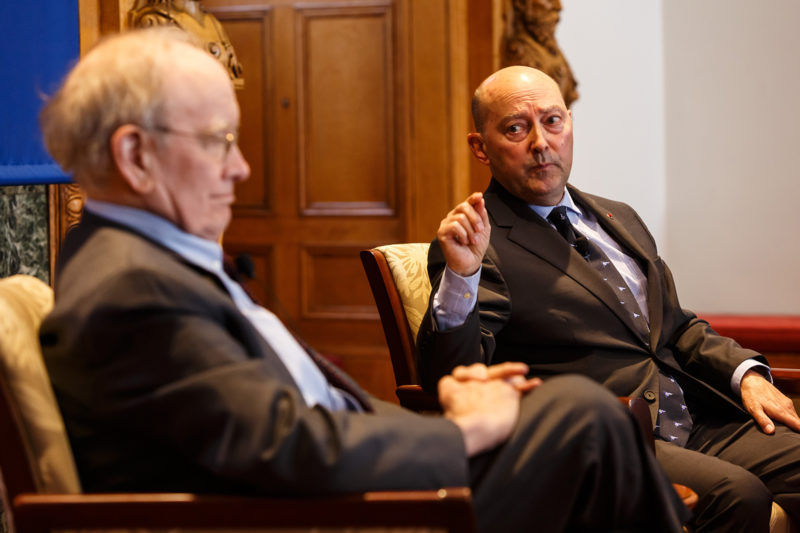Admiral James Stavridis, former Supreme Allied Commander of NATO, and John Gaddis, Robert A. Lovett Professor of Military and Naval History at Yale, discussed “Challenges to American Military Power.”
A four-star admiral and a noted historian engaged in a discussion about the challenges to American military power on Feb. 5 in the Jackson Institute’s Horchow Hall.
Admiral James Stavridis, former Supreme Allied Commander of NATO who spent 37 years in the Navy, and Yale Professor John Gaddis, Robert A. Lovett Professor of Military and Naval History and a Pulitzer Prize winner, kicked off the conversation by addressing the rise of China. Gaddis pointed out that the U.S. finds itself in the unusual circumstance of being challenged from the land and the sea, creating a new geopolitical environment.
The two discussed the contentious issue of the South China Sea, which contains hydrocarbons and serves as a major global trade route. “China is looking outward in ways it hasn’t done in 500 years,” Stavridis said. “We must take note of that.”
Gaddis asked Stavridis to comment on the role of the U.S. in the world. Stavridis emphasized the importance of sea power and maintaining U.S. maritime resources. “We become vulnerable if we don’t have some control over the oceans,” he said.
Stavridis also addressed the topic of leadership, a main theme of his recently published book, “Sailing True North: Ten Admirals and the Voyage of Character.”
He talked about the role of character and temperament in leaders. “Leadership can be exercised for good or for ill,” Stavridis said. “There are so many books on leadership, but character is the critical thing.”
The military needs leaders with conviction and determination, but it also needs innovators, he added.
Stavridis named Rear Admiral Grace Murray Hopper as the admiral he most admired because of her intellectual curiosity. Yale honored Hopper by naming one of its residential colleges after the pioneering naval leader and Yale graduate.
After the discussion, Stavridis took questions from the audience. One participant asked about the advantages of a military career. Stavridis noted that the military offers the opportunity to serve one’s country and see the world, but emphasized that there are many ways to serve. “I appreciate when people thank me for my [military] service. But you should also thank a teacher. Thank your faculty members,” he said, addressing the many students in the room.
Stavridis was also asked about the relevance of NATO, the U.S. policy toward Taiwan, the threat of cyber warfare and the readiness of the U.S. Navy. Citing the recent collisions of two vessels in Asia, Stavridis observed, “That should really wake us up.”
The talk was followed by a short reception.
